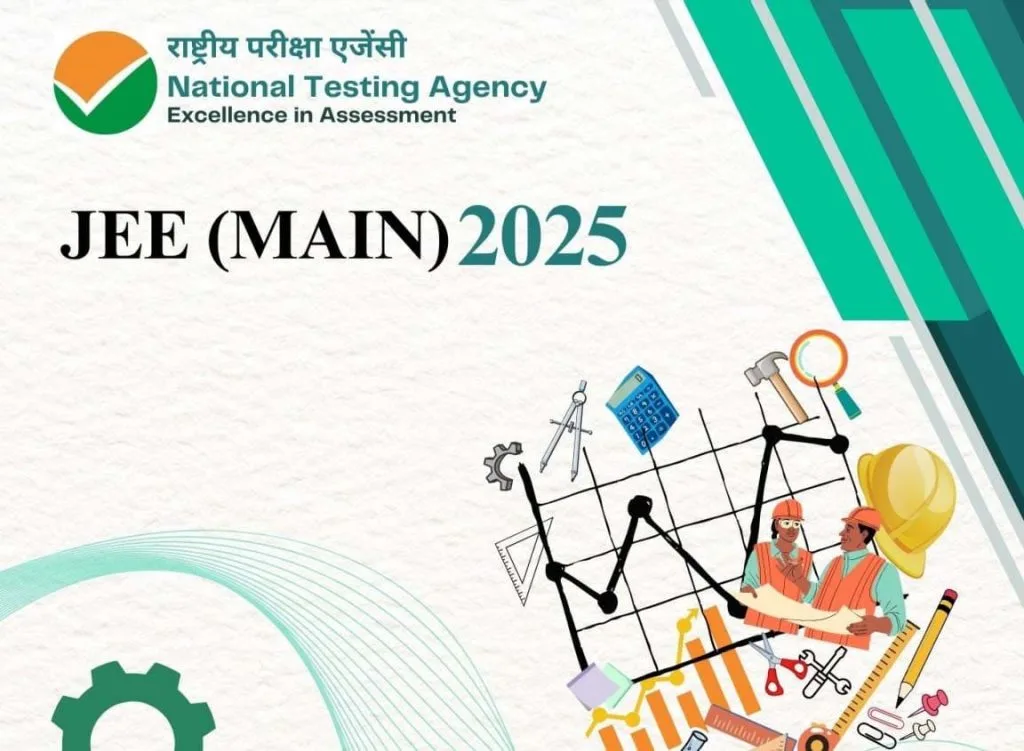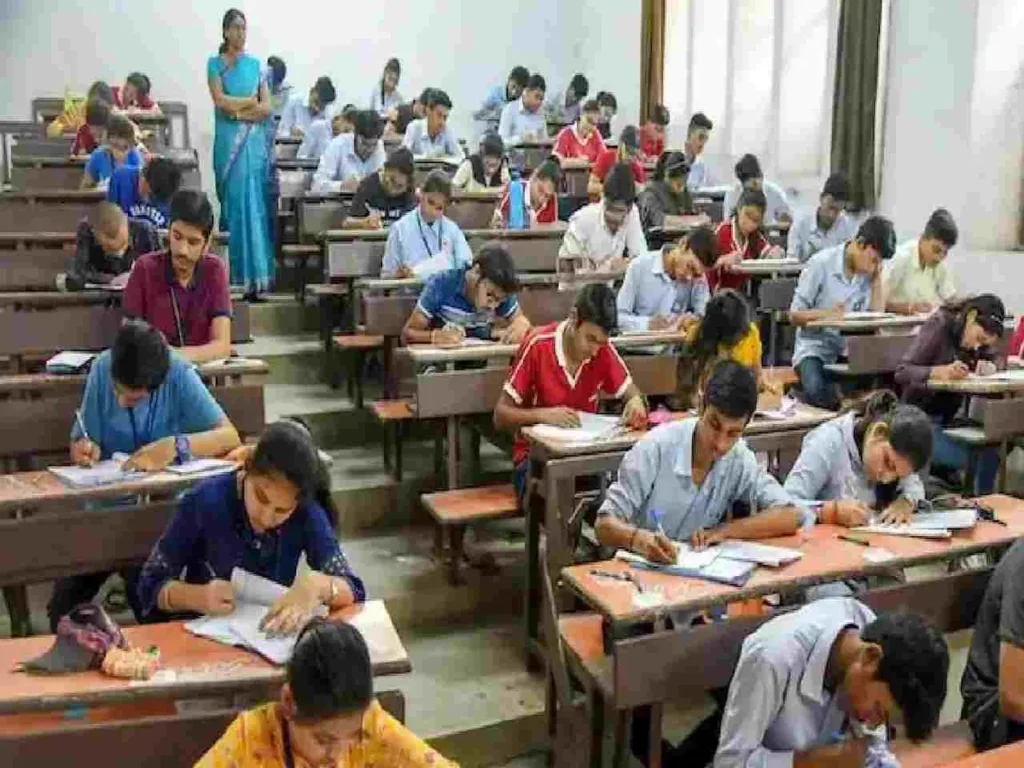The National Testing Agency (NTA) started JEE Main 2025 Session 1 registration on October 28, 2024. The exam is likely to take place between January 22 to 31, The last date for registration is 22 November, 2024.

JEE Main 2025 Registration and Exam Date:
The National Testing Agency(NTA) begins the registration process for the Joint Entrance Examination (JEE) 2025 on October 28, 2024 (Monday), for the January Session. Candidates who wish to appear for the examination can visit the official website, jeemain.nta.nic.in, to check the full schedule for the examination.
The last date to apply is November 22, 2024, by 9 PM, and the payment of the fee can be done through credit / debit card / Net-Banking / UPI by November 22, 2024, up to 11:50 PM.
JEE Main 2025 Syllabus:
JEE Main 2025 syllabus for Physics, Chemistry, and Mathematics:
| Subject | Units/Topics |
|---|---|
| Physics | Section A: Theoretical Topics |
| Physical World and Measurement: Units and measurements, least count, accuracy and precision, etc. | |
| Kinematics: Frame of reference, motion in a straight line, uniform & non-uniform motion. | |
| Laws of Motion: Newton’s laws, Inertial and non-inertial frames. | |
| Work, Energy, and Power: Work-energy theorem, kinetic and potential energy. | |
| Rotational Motion: Rigid body dynamics, rotational kinetic energy, moment of inertia. | |
| Gravitation: Newton’s law of gravitation, gravitational potential, satellite motion. | |
| Thermodynamics: First law of thermodynamics, heat transfer processes. | |
| Electrostatics: Electric field and potential, capacitors, Coulomb’s law. | |
| Current Electricity: Ohm’s law, electrical circuits, Kirchhoff’s laws. | |
| Magnetic Effects of Current & Magnetism: Biot-Savart law, Ampere’s law, magnetic dipole, solenoids. | |
| Electromagnetic Induction and AC: Faraday’s law, inductance, alternating currents. | |
| Optics: Reflection, refraction, wave optics, optical instruments. | |
| Modern Physics: Photoelectric effect, Bohr’s model, nuclear physics, semiconductors. | |
| Section B: Experimental Skills: Vernier calipers, screw gauge, meter bridge, etc. | |
| Chemistry | Section A: Physical Chemistry |
| Some Basic Concepts of Chemistry: Mole concept, stoichiometry, atomic structure. | |
| States of Matter: Gases and liquids, ideal gas laws, Van der Waals equation. | |
| Atomic Structure: Bohr’s model, quantum numbers, electronic configurations. | |
| Thermodynamics: Enthalpy, internal energy, Hess’s law. | |
| Chemical Kinetics: Rate laws, reaction mechanisms, Arrhenius equation. | |
| Chemical Bonding and Molecular Structure: Lewis structures, VSEPR theory, hybridization. | |
| Equilibrium: Law of mass action, Le Chatelier’s principle, acids and bases, buffer solutions. | |
| Electrochemistry: Nernst equation, galvanic cells, electrolysis. | |
| Surface Chemistry: Adsorption, catalysts, colloids. | |
| Section B: Organic Chemistry | |
| Hydrocarbons: Alkanes, alkenes, alkynes, aromatic hydrocarbons. | |
| Alcohols, Phenols, and Ethers: Structure, properties, reactions. | |
| Aldehydes and Ketones: Preparation, properties, uses. | |
| Carboxylic Acids: Acidity, reactions, preparation. | |
| Polymers and Biomolecules: DNA, RNA, enzymes, carbohydrates, proteins. | |
| Mathematics | Sets, Relations, and Functions: Set theory, relations, functions, and graphs. |
| Complex Numbers and Quadratic Equations: Argand plane, polar form, roots of complex numbers. | |
| Matrices and Determinants: Types of matrices, determinants, and inverse of a matrix. | |
| Permutations and Combinations: Counting techniques, probability. | |
| Binomial Theorem and its Applications: General term, expansion, coefficients. | |
| Sequences and Series: Arithmetic, geometric, and harmonic progressions. | |
| Limits, Continuity, and Differentiability: Concepts of limits, L’Hospital’s Rule, continuity, differentiability. | |
| Integral Calculus: Definite and indefinite integrals, applications of integrals. | |
| Differential Equations: Formation and solutions, order and degree. | |
| Coordinate Geometry: Straight lines, circles, parabolas, ellipses, hyperbolas. | |
| Three Dimensional Geometry: Planes, lines, distance, and angles. | |
| Vector Algebra: Scalars, vectors, dot and cross products. | |
| Trigonometry: Trigonometric identities, equations, and applications. | |
| Statistics and Probability: Mean, variance, standard deviation, probability distributions. |
JEE Main 2025 Exam Pattern:
The JEE Main 2025 paper 1, which is common for BE/Btech, comprises 75 Questions for 300 Marks. Section A will have multiple-choice questions (MCQs), and Section B will have 15 questions for which numerical values can be used to answer.
The three-hour exam will take place in CBT mode. The National Testing Agency (NTA) has changed the JEE Main paper to it’s pre-Covid-19 formation and Section B only has 5 questions and all are mandatory. https://aajpatrika24.com/ipl-retention-2025-announcement-live-updates/
Important Dates for JEE Main 2025 Exam:
Along with the official brochure, the NTA has also released the exam schedule. The JEE main 2025 examination (Session 1) is to be held between January 22 and 31. The admit card for JEE main exam 2025 will be out three days before the exam. To download the admit card, candidates should log in using their registration and Date of birth.

The exam will held in two sessions- in January (Session 1) and April (Session 2). The registration has started for Session 1. This year, the JEE Main exam will take place in 13 languages– Hindi, Assamese, Bengali, Gujarati, Kannada, Malayalam, Marathi, Odia, Punjabi, Tamil, Telugu, and Urdu.
Students who are seeking admission to engineering and architecture programs at National Institute of Technology (NITs), Indian Institute of Information Technology (IIITs), and other institutions should appear for the JEE Main examination.
JEE Main 2025, serves as qualifying exam for JEE Advance 2025.
